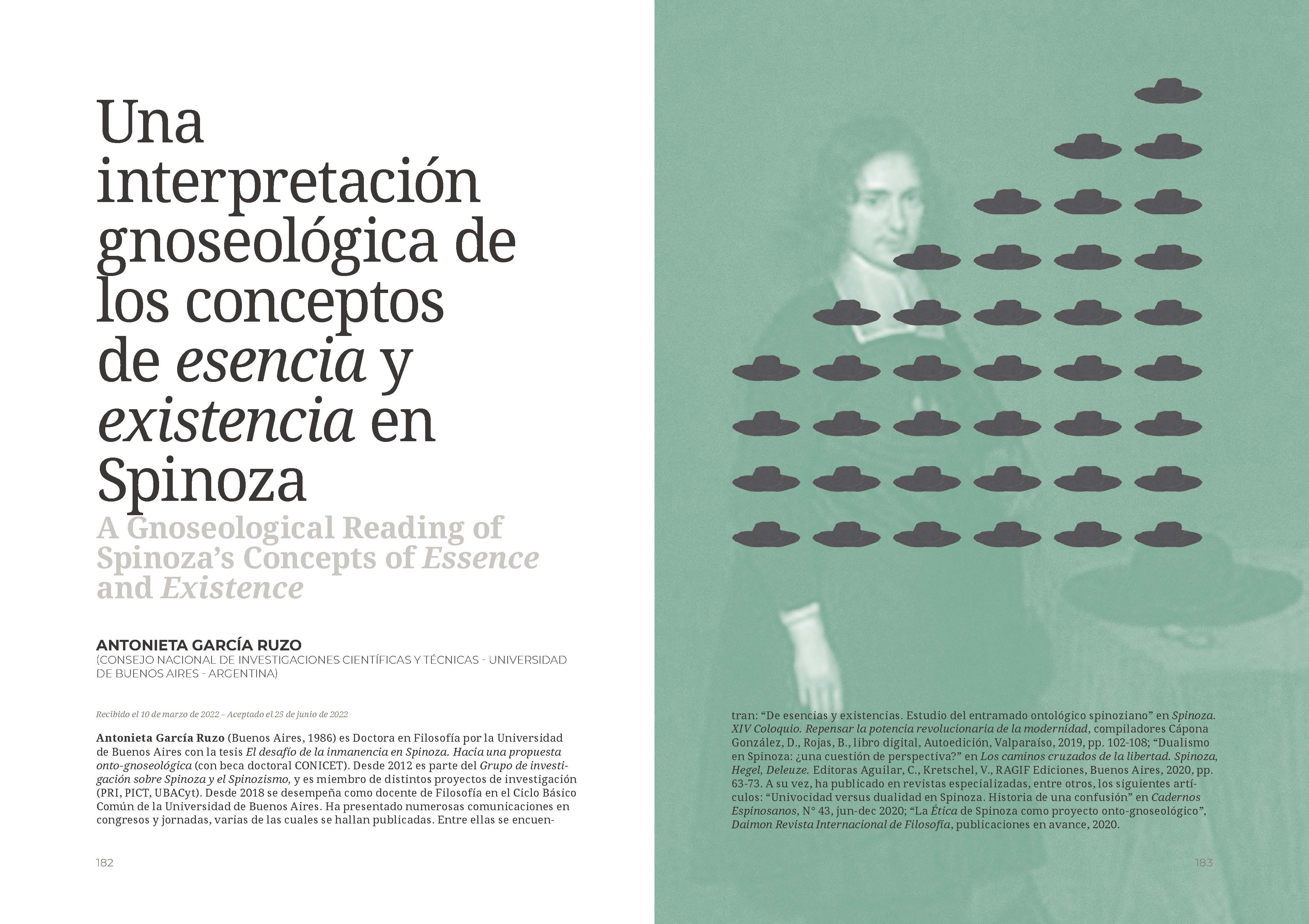Una interpretación gnoseológica de los conceptos de esencia y existencia en Spinoza
DOI:
https://doi.org/10.69498/ri.2022.15-16.52Palabras clave:
onto-gnoseología, esencia, existencia, dualismo, univocidadResumen
El presente trabajo busca alejarse de las lecturas tradicionales de los conceptos spinozianos de esencia y existencia para brindar una interpretación de estos en función de una hipótesis que denominamos onto-gnoseológica. Los estudios que se han hecho acerca de la dupla esencia-existencia han optado por entenderla como la expresión de un dualismo ontológico o ignorarla por completo. Frente a estas lecturas, el objetivo de estas páginas es demostrar que Spinoza asocia, a lo largo de todo su trabajo, las nociones de esencia y existencia a las maneras de conocer humanas y no a estratos ontológicos. Esta resignificación permite entender el proyecto filosófico spinoziano de un modo más profundo, como un proyecto en el que la dualidad gnoseológica no sólo es coherente con la univocidad de lo real, sino absolutamente necesaria para reconocer los límites del conocimiento humano y la posibilidad de acceder a la beatitud o felicidad.
Descargas
Citas
Obras de Spinoza
[Spinoza, B.], Opera, Heidelberger Akademie der Wissenschaften, ed. Carl Gebhardt, 4 tomos, Heidelberg, Carl Winter-Verlag, 1925.
Spinoza, B.., Ética demostrada según el orden geométrico, trad. y notas de Vidal Peña. Madrid, Alianza, 2016.
Spinoza, B., Tratado de la reforma del entendimiento / Principios de filosofía de Descartes, Pensamientos metafísicos, trad. Atilano Domínguez, Madrid, Alianza, 1988.
Spinoza, B., Tratado breve, trad. Atilano Domínguez, Madrid, Alianza, 1990.
Spinoza, B., Epistolario, trad. Oscar Cohan, Buenos Aires, Colihue, 2007.
Bibliografía secundaria
Allison, H., Benedict de Spinoza. An Introduction, New Haven and London, Yale University Press, 1987.
Bennett, J., A Study of Spinoza's Ethics, Hackett Publishing Company, 1984.
Benvenuto, R. M., "El concepto de imaginación y la constitución de lo imaginario en la filosofía de Spinoza" en Actas del Cuarto Simposio de Filosofía Moderna. Rosario, 2017, Rosario, UNR Editora, 2019.
Chaui, M., A Nervura do real. Imanência e liberdade em Espinosa, Parte I, São Paulo, Companhia das Letras, 1999.
Cohen, D., Spinoza. Una cartografía de la Ética, Buenos Aires, Eudeba, 2015.
Curley, E. M., Behind the Geometrical Method: A Reading of Spinoza's Ethics, Princeton NJ, Princeton University Press, 1988.
https://doi.org/10.1515/9780691214269
De Dijn, H.,"Metaphysics as Ethics" en Yovel, Y. (ed): God and Nature: Spinoza's Metaphysics: Papers Presented at the First Jerusalem Conference, Leiden, Brill, 1991.
https://doi.org/10.1163/9789004451650_012
Deleuze, G., En medio de Spinoza, Buenos Aires, Cactus, 2008.
Deleuze, G., Spinoza y el problema de la expresión, trad. Horst Vogel, Barcelona, Muchnik, 1996.
Deleuze, G., Spinoza. Filosofía práctica, Buenos Aires, Tusquets, 2013.
García Ruzo, A. "La Ética de Spinoza como proyecto onto-gnoseológico", Daimon Revista Internacional de Filosofía, N° 86, pp. 101-116. https://doi.org/10.6018/daimon.423251
https://doi.org/10.6018/daimon.423251
Garrett, D., "Spinoza on the Essence of the Human Body and the Part of the Mind that is Eternal", en Koistinen, O., Cambridge Companion to Spinoza's Ethics, Cambridg, Cambridge University Press, 2009.
https://doi.org/10.1017/CCOL9780521853392.014
Jarrett, C., "Spinoza's distinction between essence and existence", en Olyyun. The Jerusalem Philosophical Quarterly, N° 50, Julio 2001, pp. 245-252.
Joachim, H. H., Spinoza's Tractatus de intellectus emendatione, Oxford, Claredon Press, 1940.
Joachim, H. H., A Study of the Ethics of Spinoza, Oxford, Clarendon Press, 1901.
Klein, Julie, "'By eternity I understand': Eternity according to Spinoza" en Olyyun. The Jerusalem Philosophical Quarterly, N° 51, Julio 2002, pp. 295-324.
Koyré, A., Traité de la réforme de l'entendement, Paris, Vrin, 1938.
Laerke, M. "Aspects of Spinoza's Theory of Essence. Formal essence, non-existence, and two forms of actuality," en M. Sinclair (ed.), The Actual and the Possible, Oxford, Oxford University Press, 2017.
https://doi.org/10.1093/oso/9780198786436.003.0002
Marshal, E., The Spiritual Automaton. Spinoza's Science of the Mind, Oxford, Oxford University Press, 2013.
Martin, C. P., "The Framework of Essences in Spinoza's Ethics", British Journal for the History of Philosophy, N° 16:3, 2008, pp. 489-450.
https://doi.org/10.1080/09608780802200489
Morfino, V., "Esencia y Relación" en Revista Pensamiento Político, N° 6, 2015.
https://doi.org/10.46661/revintpensampolit.1877
Nadler, S., "Spinoza's Monism and the Reality of the Finite" en Goff, P. Spinoza on Monism, Palgrave Macmilla UK, Universidad de Liverpool, 2012.
Nadler, S., Spinoza's Heresy. Inmortality and Jewish Mind, Oxford, Oxford University Press, 2001.
https://doi.org/10.1093/0199247072.001.0001
Schmaltz, T., "Spinoza on Eternity and Duration: The 1663 Connection", en Melamed, Y. (ed.), The Young Spinoza. A Metaphysician in the Making, Oxford, Oxford University Press, 2015, pp. 205-220.
https://doi.org/10.1093/acprof:oso/9780199971657.003.0014
Steinberg, D., "Knowledge in Spinoza's Ethics" en Olli Koistinen (ed.), The Cambridge Companion to Spinoza's Ethics, Cambridge, Cambridge University Press, 2009.
https://doi.org/10.1017/CCOL9780521853392.008
Tatián, D. (comp.), Spinoza: Cuarto Coloquio, Córdoba, Brujas, 2008.
Viljanen, V., Spinoza's Geometry of Power, New York, Cambridge University Press, 2011.
https://doi.org/10.1017/CBO9781139005210
Yovel, Y., Spinoza and Other Heretic, Princeton NJ, Princeton University Press, 1988.

Publicado
Cómo citar
Número
Sección
Licencia
Derechos de autor 2022 Antonieta García Ruzo

Esta obra está bajo una licencia internacional Creative Commons Atribución-NoComercial-CompartirIgual 4.0.








